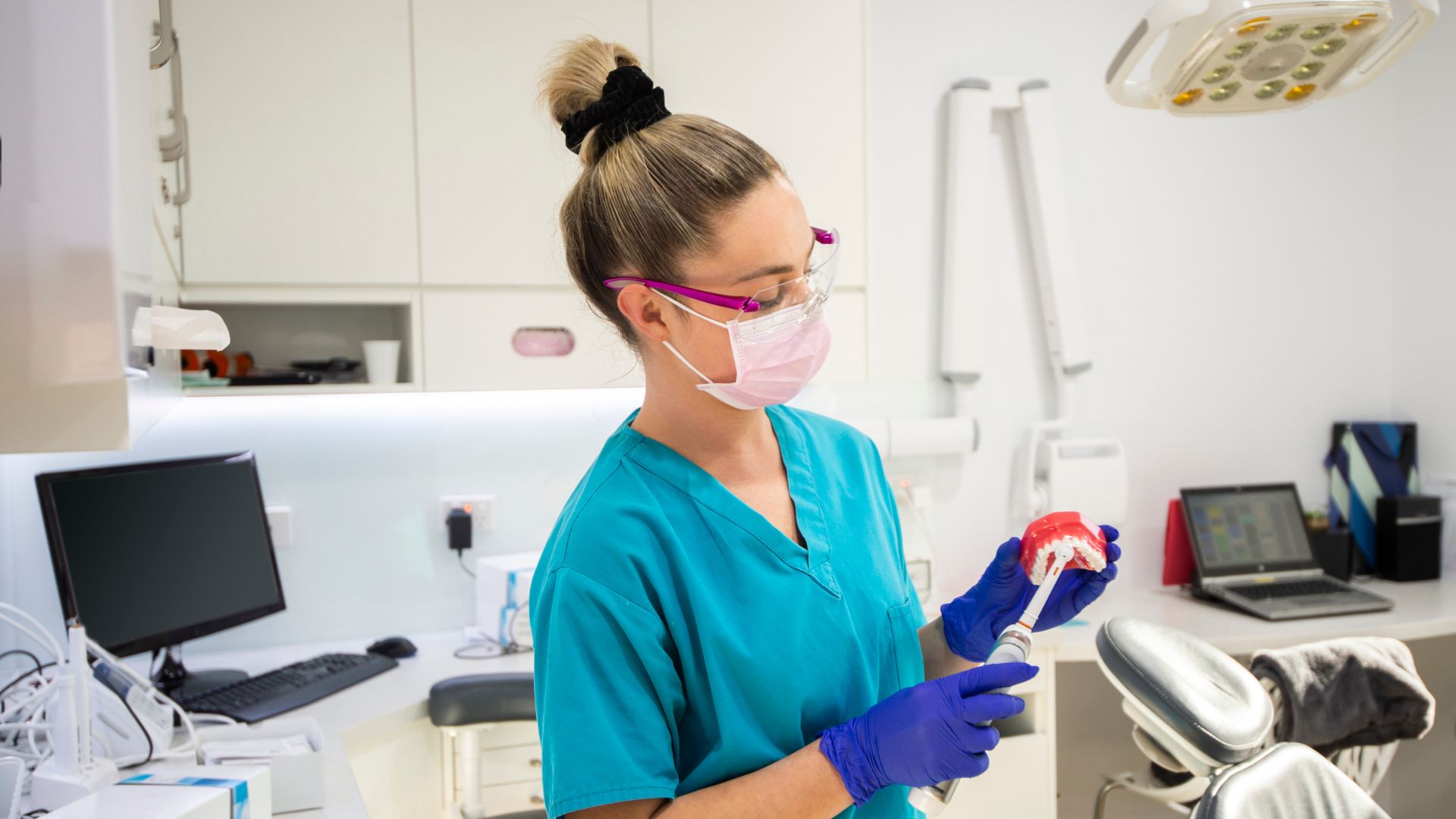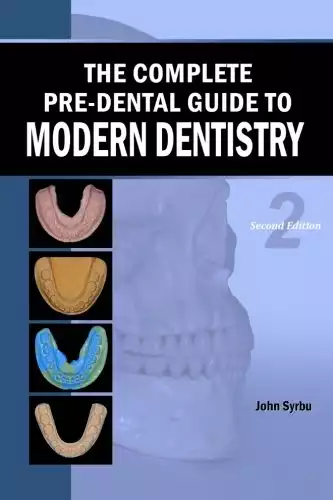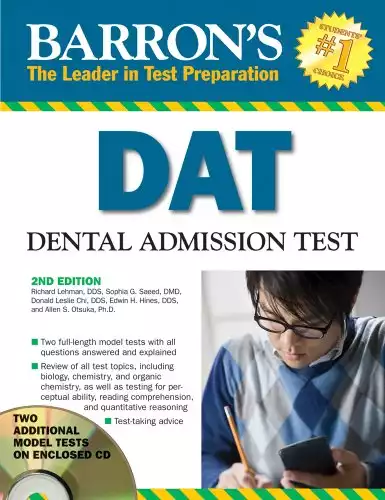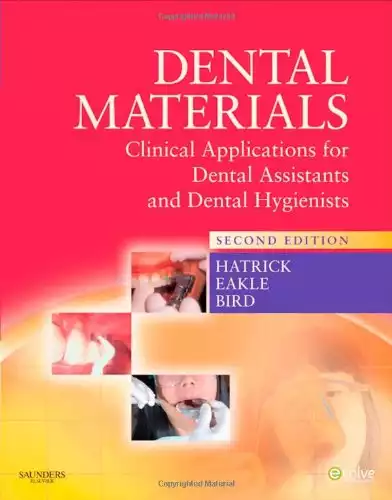We may receive compensation when you click on links to products from our partners. For more information, please see our disclosure policy.
Career Opportunities in Dentistry
- General Dentist – Diagnoses, treats, and manages the overall oral healthcare needs of patients.
- Dental Hygienist – Provides preventive dental care services, such as cleaning teeth, applying fluoride treatments, and taking X-rays.
- Dental Assistant – Assists the dentist during procedures, prepares materials and equipment, and provides patient care.
- Dental Lab Technician – Creates dental prosthetics, such as crowns, bridges, and dentures, based on impressions provided by the dentist.
- Endodontist – Specializes in diagnosing and treating issues with dental pulp, such as root canals and traumatic injuries.
- Orthodontist – Specializes in the diagnosis, prevention, and treatment of dental and facial irregularities, such as malocclusions and jaw misalignments.
- Oral and Maxillofacial Surgeon – Performs surgical procedures on the mouth, jaw, and face, such as tooth extractions, corrective jaw surgery, and facial reconstruction.
- Periodontist – Specializes in the diagnosis and treatment of gum disease, including periodontal surgery and dental implant placement.
- Pediatric Dentist – Specializes in providing dental care for children, including preventive care, restorative treatments, and behavioral management techniques.
- Dental Anesthesiologist – Provides anesthesia and sedation services to patients during dental procedures, ensuring their comfort and safety.
Dentist
Common dentistry degrees awarded to general dentists include BDS (Bachelor of Dental Surgery) and MChD/ BChD (Master/ Bachelor of Dental Surgery). Though named differently, both degrees are essentially the same, covering identical subjects. Dental specialists undergo additional training and education after receiving their degree in general dentistry.
Want to help people achieve a healthy and confident smile? Explore the exciting career opportunities in dentistry and unlock your smile's future today! #dentistry #dentalcareers #smilemakeoverClick To TweetThe main responsibility of a general dentist is to coordinate different dental treatments after diagnosis. The treatment and management of a patient are handled by a general dentist. Taking overall care and maintenance of oral health, general dentists are trained in all procedures. Some examples of dental specialists include cosmetic dentists, orthodontists, endodontists and oral surgeons.
 Dental hygienist
Dental hygienist
Dental hygienists are licensed professionals who have completed a recognized dental hygiene course and focus on preventive oral care. Their primary responsibility involves promoting good oral health through clinical, administrative, educational, therapeutic, and research services. Dental hygienists work alongside general dentists and possess specialized skills in preventive oral healthcare.
Dental assistant
Dental assistants are trained professionals who assist dentists during treatments, with responsibilities that include keeping the instruments and work area clean, as well as performing numerous lab procedures. With a high school degree and a few years of on-the-job training with a dental clinic, you can become a dental assistant and perform tasks ranging from constructing dentures to carving models of the mouth and teeth.
A registered dental assistant is licensed from an accredited program, which involves intensive education including comprehensive written exams as well as practical exams. Certified dental assistants are authorized to perform more complex functions to support the general dentist in ensuring that all treatments run smoothly. By providing immediate services during treatments, dental assistants help improve the dentist’s efficiency.
Dental lab technicians
Dental lab technicians are responsible for creating tooth crowns, bridges, dentures, and other orthodontic appliances based on written instructions provided by the general dentist. These professionals work with various materials like porcelain, wax, plastic, and precious or non-precious alloys to create contraptions for dental restorations and replacements. Dental lab technicians can work in a variety of settings, from personal labs to dental offices, hospitals, dental schools, and even for dental suppliers and manufacturers.
While a
Additional Resources
The Complete Pre-Dental Guide to Modern Dentistry
The Complete Pre-Dental Guide to Modern Dentistry by Cory M. Resnick – A guide for individuals interested in a career in dentistry, covering admission requirements, academic preparation, and the dental school application process.
The Complete Pre-Dental Guide to Modern Dentistry provides practical information for students interested in dentistry and prospective dental students.
Barron’s DAT: Dental Admission Test
Barron’s DAT: Dental Admission Test by Richard Lehman – A comprehensive guide to maximizing scores on the Dental Admission Test (DAT), covering all sections of the exam.
Start Here – Path To A Profitable Dental Practice
Start Here – Path To A Profitable Dental Practice is a comprehensive guidebook for dentists written by Dr. David Moffet, who provides practical strategies and expert insights on all aspects of running a dental business, from marketing and finance to patient management and
Start Here - Path To A Profitable Dental Practice
$9.99
Learn proven secrets for dental practice success from the trailblazing woman dentist who built a multimillion-dollar practice after age 40.
Buy on Amazon
Buy on Walmart.com
We earn a commission if you click this link and make a purchase at no additional cost to you.
07/26/2024 11:28 pm GMT
Learn proven secrets for dental practice success from the trailblazing woman dentist who built a multimillion-dollar practice after age 40.
Dental Materials: Clinical Applications for Dental Assistants and Dental Hygienists
Dental Materials: Clinical Applications for Dental Assistants and Dental Hygienists by Carol Dixon Hatrick and W. Stephan Eakle – A textbook that provides a comprehensive overview of dental materials and their practical applications for dental assistants and hygienists.
With this hands-on resource, you will learn the most current methods of placing -- or assisting in the placement -- of dental materials, and how to instruct patients in their maintenance.
Conclusion
Dentistry offers a wide range of career opportunities for individuals who are passionate about oral health and helping others. From general dentists and dental hygienists to dental assistants and lab technicians, there are various paths to choose from. With ongoing advancements in technology and increased focus on preventive care, the future of dentistry is bright and promising. If you are interested in pursuing a career in dentistry, it is essential to explore the different options available and find a path that aligns with your skills, interests, and career goals. By doing so, you can unlock your smile’s future and make a positive impact on the oral health of patients for years to come.








